Unit4 Time to celebrate单元语法填空专项训练100题(含答案)2025外研版七年级上册
文档属性
| 名称 | Unit4 Time to celebrate单元语法填空专项训练100题(含答案)2025外研版七年级上册 | 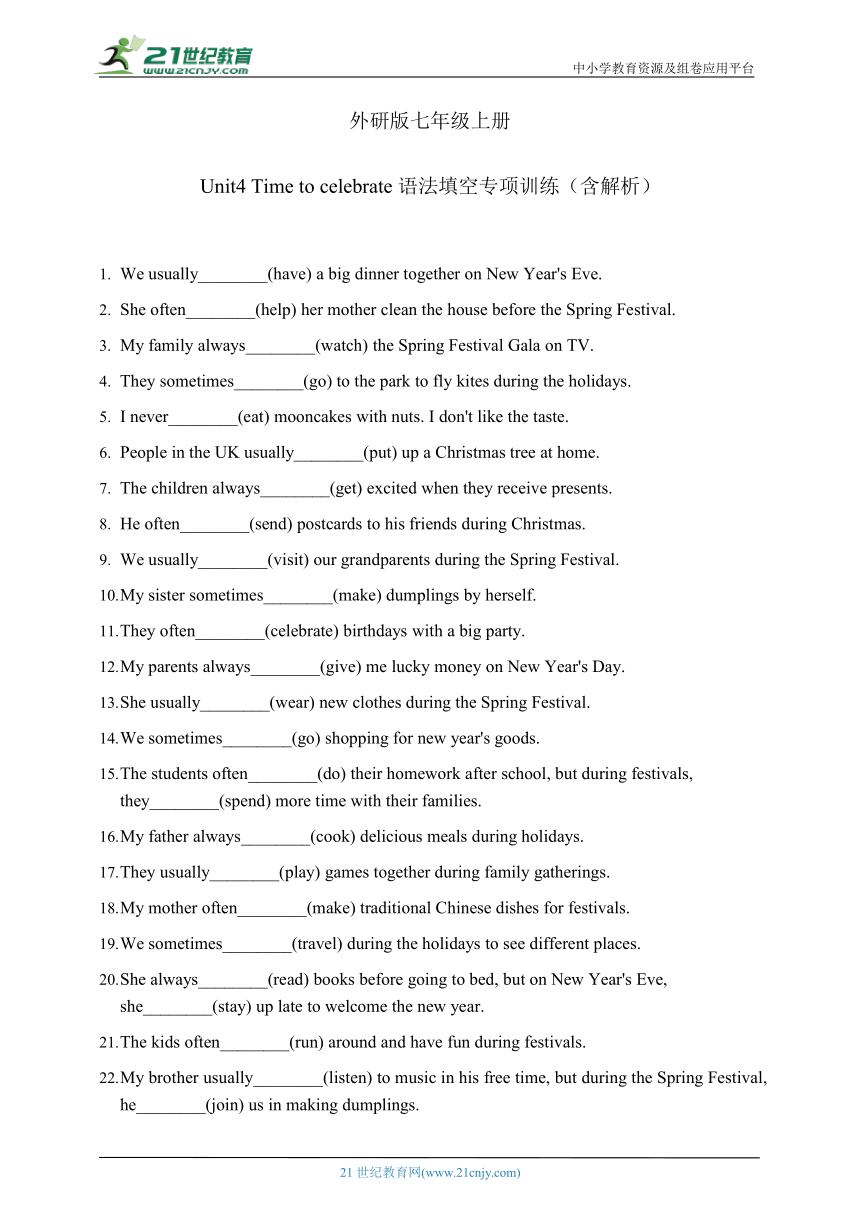 | |
| 格式 | docx | ||
| 文件大小 | 53.5KB | ||
| 资源类型 | 试卷 | ||
| 版本资源 | 外研版 | ||
| 科目 | 英语 | ||
| 更新时间 | 2025-07-26 15:03:06 | ||
图片预览

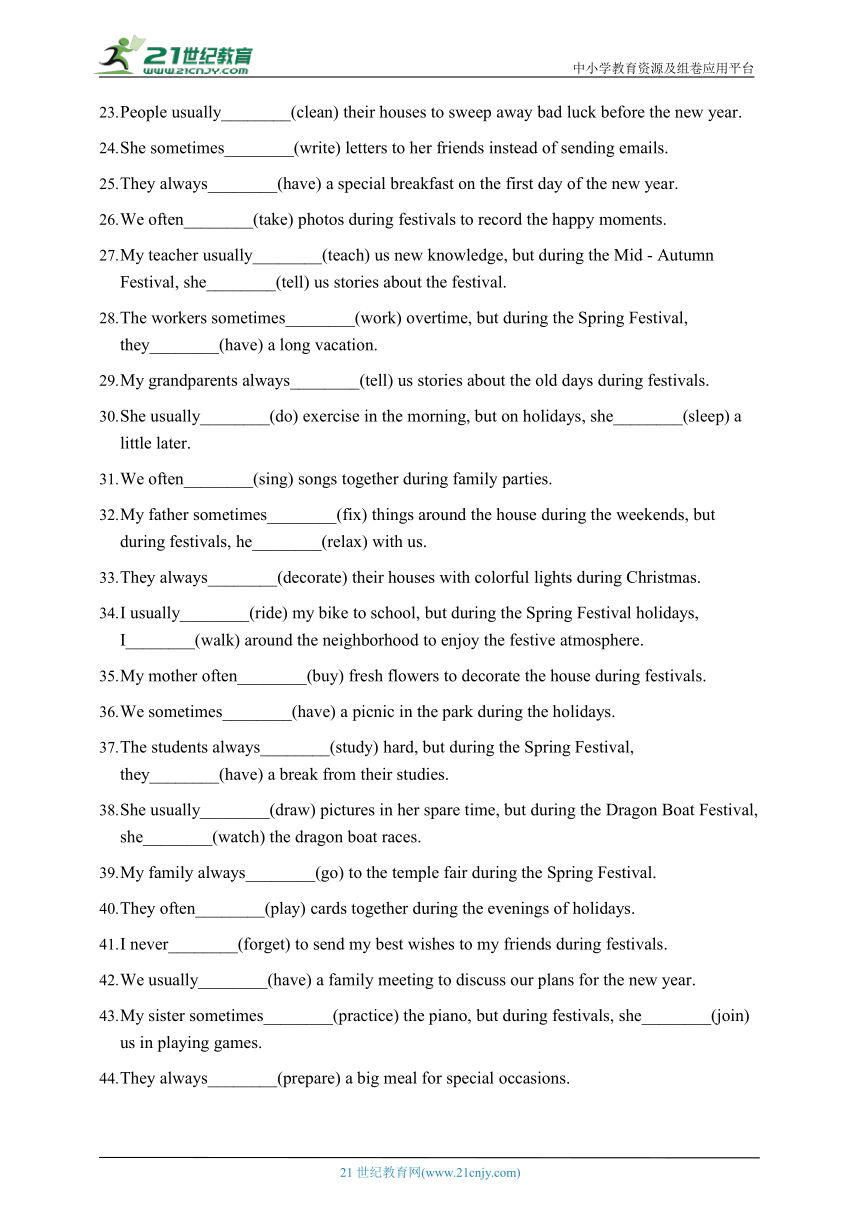
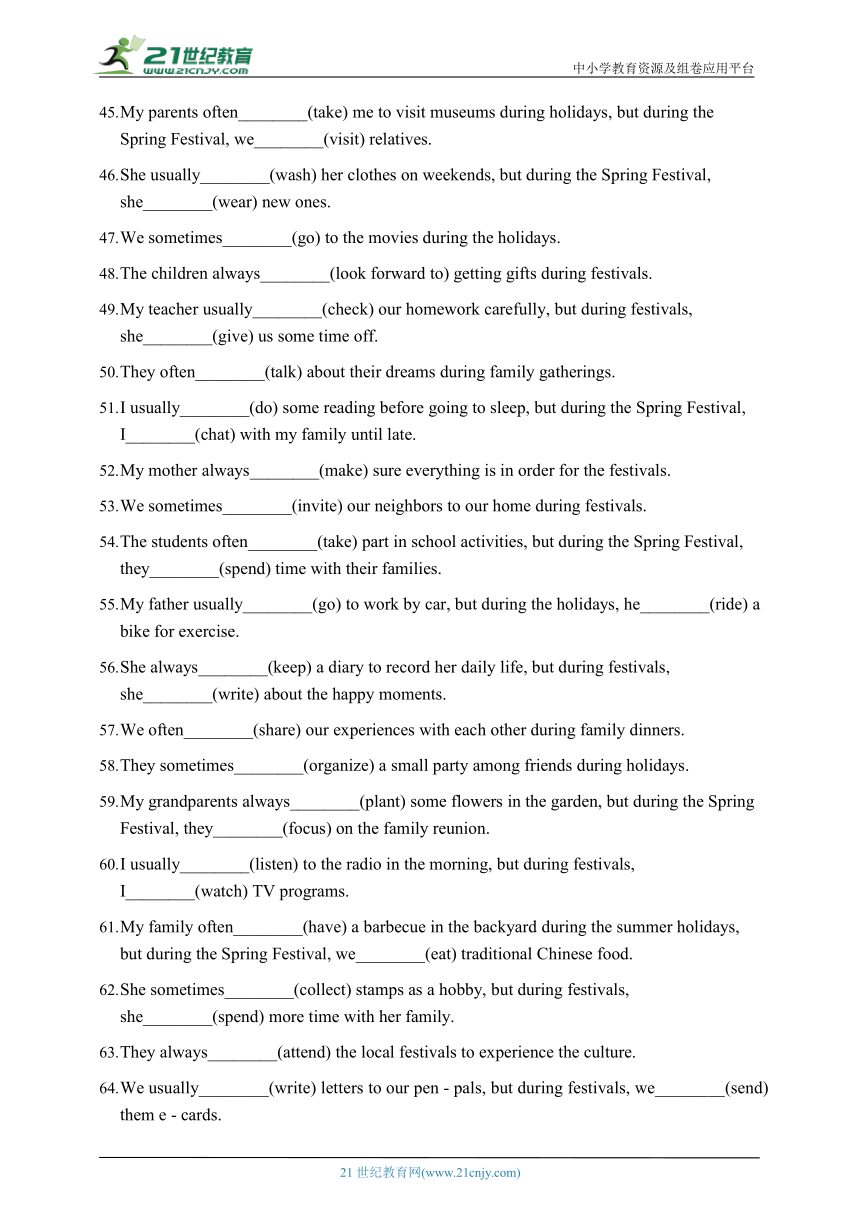
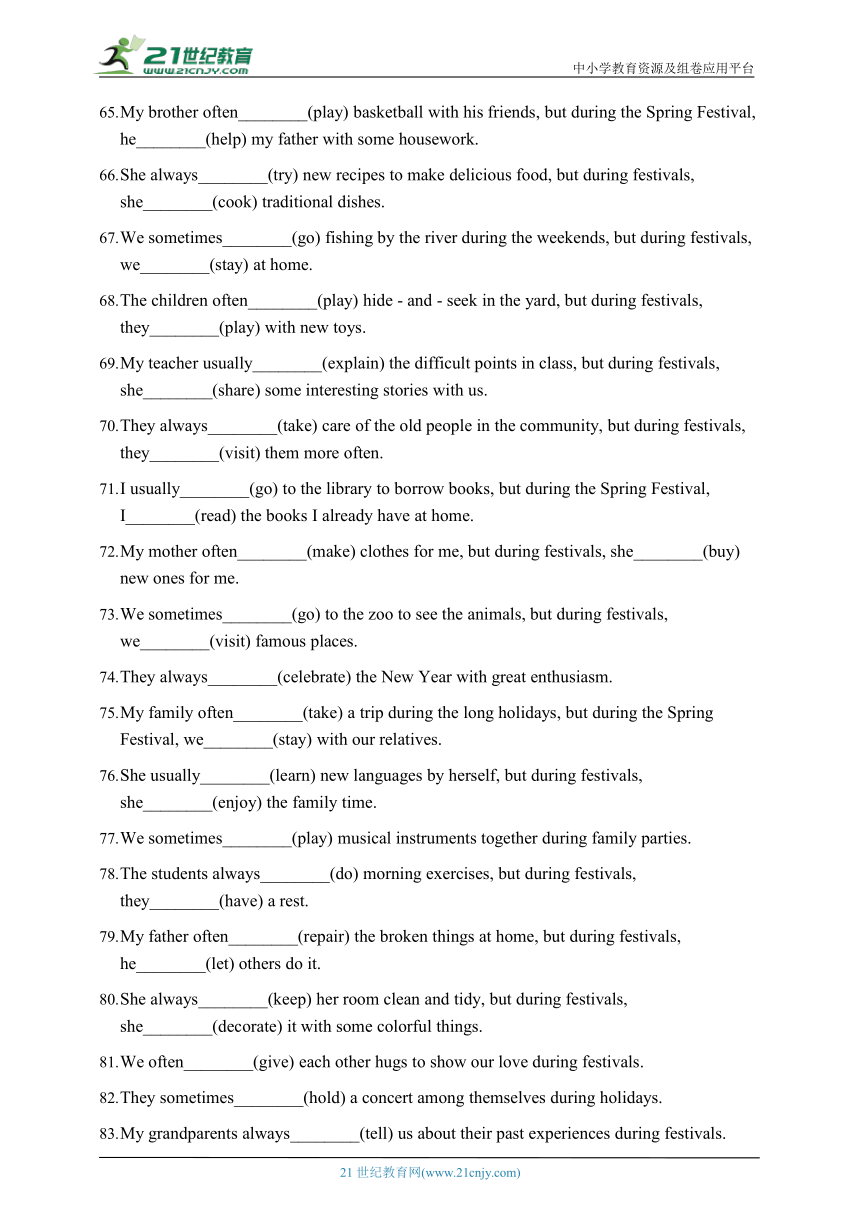
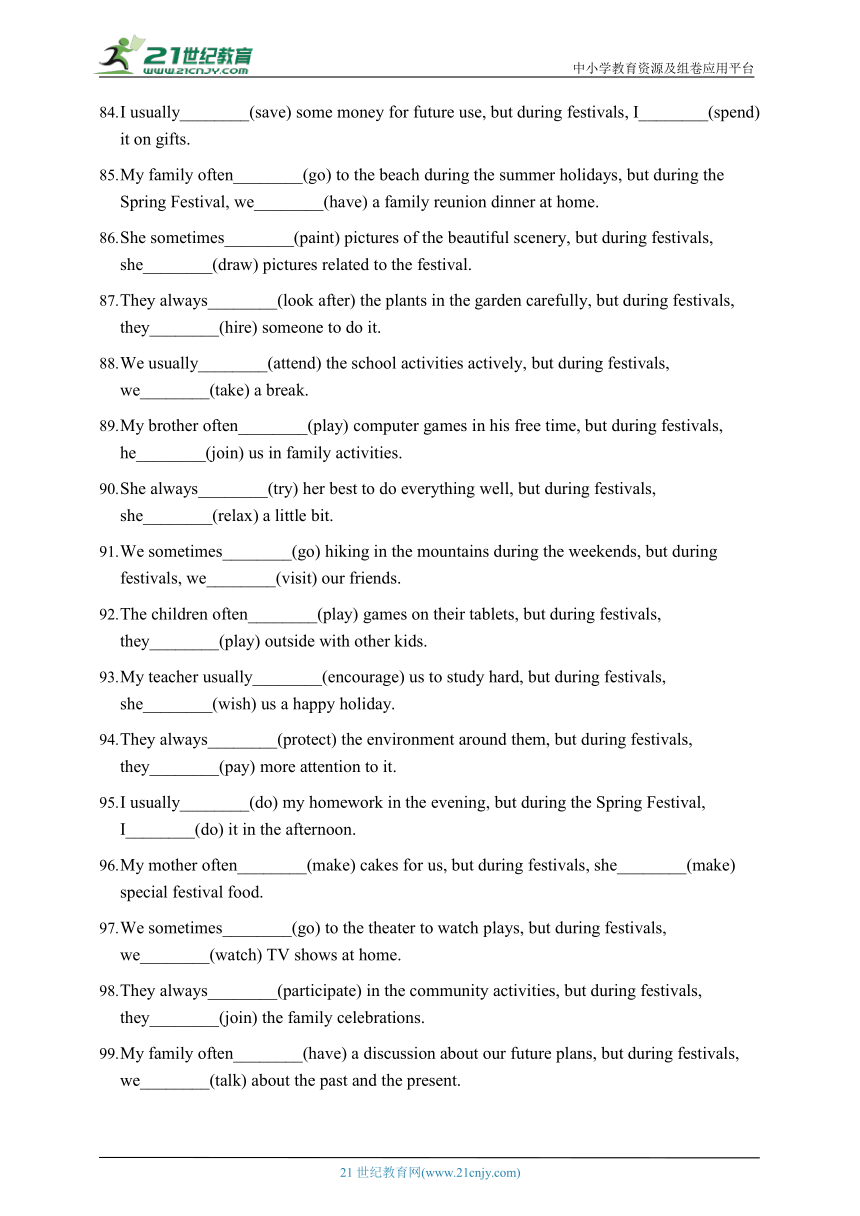
文档简介
中小学教育资源及组卷应用平台
外研版七年级上册
Unit4 Time to celebrate语法填空专项训练(含解析)
We usually________(have) a big dinner together on New Year's Eve.
She often________(help) her mother clean the house before the Spring Festival.
My family always________(watch) the Spring Festival Gala on TV.
They sometimes________(go) to the park to fly kites during the holidays.
I never________(eat) mooncakes with nuts. I don't like the taste.
People in the UK usually________(put) up a Christmas tree at home.
The children always________(get) excited when they receive presents.
He often________(send) postcards to his friends during Christmas.
We usually________(visit) our grandparents during the Spring Festival.
My sister sometimes________(make) dumplings by herself.
They often________(celebrate) birthdays with a big party.
My parents always________(give) me lucky money on New Year's Day.
She usually________(wear) new clothes during the Spring Festival.
We sometimes________(go) shopping for new year's goods.
The students often________(do) their homework after school, but during festivals, they________(spend) more time with their families.
My father always________(cook) delicious meals during holidays.
They usually________(play) games together during family gatherings.
My mother often________(make) traditional Chinese dishes for festivals.
We sometimes________(travel) during the holidays to see different places.
She always________(read) books before going to bed, but on New Year's Eve, she________(stay) up late to welcome the new year.
The kids often________(run) around and have fun during festivals.
My brother usually________(listen) to music in his free time, but during the Spring Festival, he________(join) us in making dumplings.
People usually________(clean) their houses to sweep away bad luck before the new year.
She sometimes________(write) letters to her friends instead of sending emails.
They always________(have) a special breakfast on the first day of the new year.
We often________(take) photos during festivals to record the happy moments.
My teacher usually________(teach) us new knowledge, but during the Mid - Autumn Festival, she________(tell) us stories about the festival.
The workers sometimes________(work) overtime, but during the Spring Festival, they________(have) a long vacation.
My grandparents always________(tell) us stories about the old days during festivals.
She usually________(do) exercise in the morning, but on holidays, she________(sleep) a little later.
We often________(sing) songs together during family parties.
My father sometimes________(fix) things around the house during the weekends, but during festivals, he________(relax) with us.
They always________(decorate) their houses with colorful lights during Christmas.
I usually________(ride) my bike to school, but during the Spring Festival holidays, I________(walk) around the neighborhood to enjoy the festive atmosphere.
My mother often________(buy) fresh flowers to decorate the house during festivals.
We sometimes________(have) a picnic in the park during the holidays.
The students always________(study) hard, but during the Spring Festival, they________(have) a break from their studies.
She usually________(draw) pictures in her spare time, but during the Dragon Boat Festival, she________(watch) the dragon boat races.
My family always________(go) to the temple fair during the Spring Festival.
They often________(play) cards together during the evenings of holidays.
I never________(forget) to send my best wishes to my friends during festivals.
We usually________(have) a family meeting to discuss our plans for the new year.
My sister sometimes________(practice) the piano, but during festivals, she________(join) us in playing games.
They always________(prepare) a big meal for special occasions.
My parents often________(take) me to visit museums during holidays, but during the Spring Festival, we________(visit) relatives.
She usually________(wash) her clothes on weekends, but during the Spring Festival, she________(wear) new ones.
We sometimes________(go) to the movies during the holidays.
The children always________(look forward to) getting gifts during festivals.
My teacher usually________(check) our homework carefully, but during festivals, she________(give) us some time off.
They often________(talk) about their dreams during family gatherings.
I usually________(do) some reading before going to sleep, but during the Spring Festival, I________(chat) with my family until late.
My mother always________(make) sure everything is in order for the festivals.
We sometimes________(invite) our neighbors to our home during festivals.
The students often________(take) part in school activities, but during the Spring Festival, they________(spend) time with their families.
My father usually________(go) to work by car, but during the holidays, he________(ride) a bike for exercise.
She always________(keep) a diary to record her daily life, but during festivals, she________(write) about the happy moments.
We often________(share) our experiences with each other during family dinners.
They sometimes________(organize) a small party among friends during holidays.
My grandparents always________(plant) some flowers in the garden, but during the Spring Festival, they________(focus) on the family reunion.
I usually________(listen) to the radio in the morning, but during festivals, I________(watch) TV programs.
My family often________(have) a barbecue in the backyard during the summer holidays, but during the Spring Festival, we________(eat) traditional Chinese food.
She sometimes________(collect) stamps as a hobby, but during festivals, she________(spend) more time with her family.
They always________(attend) the local festivals to experience the culture.
We usually________(write) letters to our pen - pals, but during festivals, we________(send) them e - cards.
My brother often________(play) basketball with his friends, but during the Spring Festival, he________(help) my father with some housework.
She always________(try) new recipes to make delicious food, but during festivals, she________(cook) traditional dishes.
We sometimes________(go) fishing by the river during the weekends, but during festivals, we________(stay) at home.
The children often________(play) hide - and - seek in the yard, but during festivals, they________(play) with new toys.
My teacher usually________(explain) the difficult points in class, but during festivals, she________(share) some interesting stories with us.
They always________(take) care of the old people in the community, but during festivals, they________(visit) them more often.
I usually________(go) to the library to borrow books, but during the Spring Festival, I________(read) the books I already have at home.
My mother often________(make) clothes for me, but during festivals, she________(buy) new ones for me.
We sometimes________(go) to the zoo to see the animals, but during festivals, we________(visit) famous places.
They always________(celebrate) the New Year with great enthusiasm.
My family often________(take) a trip during the long holidays, but during the Spring Festival, we________(stay) with our relatives.
She usually________(learn) new languages by herself, but during festivals, she________(enjoy) the family time.
We sometimes________(play) musical instruments together during family parties.
The students always________(do) morning exercises, but during festivals, they________(have) a rest.
My father often________(repair) the broken things at home, but during festivals, he________(let) others do it.
She always________(keep) her room clean and tidy, but during festivals, she________(decorate) it with some colorful things.
We often________(give) each other hugs to show our love during festivals.
They sometimes________(hold) a concert among themselves during holidays.
My grandparents always________(tell) us about their past experiences during festivals.
I usually________(save) some money for future use, but during festivals, I________(spend) it on gifts.
My family often________(go) to the beach during the summer holidays, but during the Spring Festival, we________(have) a family reunion dinner at home.
She sometimes________(paint) pictures of the beautiful scenery, but during festivals, she________(draw) pictures related to the festival.
They always________(look after) the plants in the garden carefully, but during festivals, they________(hire) someone to do it.
We usually________(attend) the school activities actively, but during festivals, we________(take) a break.
My brother often________(play) computer games in his free time, but during festivals, he________(join) us in family activities.
She always________(try) her best to do everything well, but during festivals, she________(relax) a little bit.
We sometimes________(go) hiking in the mountains during the weekends, but during festivals, we________(visit) our friends.
The children often________(play) games on their tablets, but during festivals, they________(play) outside with other kids.
My teacher usually________(encourage) us to study hard, but during festivals, she________(wish) us a happy holiday.
They always________(protect) the environment around them, but during festivals, they________(pay) more attention to it.
I usually________(do) my homework in the evening, but during the Spring Festival, I________(do) it in the afternoon.
My mother often________(make) cakes for us, but during festivals, she________(make) special festival food.
We sometimes________(go) to the theater to watch plays, but during festivals, we________(watch) TV shows at home.
They always________(participate) in the community activities, but during festivals, they________(join) the family celebrations.
My family often________(have) a discussion about our future plans, but during festivals, we________(talk) about the past and the present.
She usually________(exercise) in the gym, but during festivals, she________(exercise) at home.
答案
have主语“we”是第一人称复数,且“usually”表明是一般现在时,动词用原形,描述除夕夜的常规行为。
helps主语“she”是第三人称单数,“often”体现一般现在时,动词“help”变第三人称单数“helps”,说明她帮妈妈打扫的习惯。
watch主语“my family”此处指家庭成员(复数概念),“always”表常态,用原形,描述看春晚的常规动作。
go主语“they”是第三人称复数,“sometimes”表一般现在时,动词用原形,说明假期去公园放风筝的情况。
eat主语“I”是第一人称,“never”体现常态,用原形,表达不喜欢带坚果月饼的习惯。
put主语“people”是复数,“usually”表一般现在时,用原形,描述英国人装饰圣诞树的常规行为。
get主语“the children”是复数,“always”表常态,用原形,说明孩子们收到礼物时的反应。
sends主语“he”是第三人称单数,“often”体现一般现在时,动词“send”变第三人称单数“sends”,描述寄明信片的习惯。
visit主语“we”是复数,“usually”表常态,用原形,说明春节拜访祖父母的常规行为。
makes主语“my sister”是第三人称单数,“sometimes”体现一般现在时,动词“make”变“makes”,描述她自己包饺子的情况。
celebrate主语“they”是复数,“often”表常态,用原形,说明用派对庆祝生日的习惯。
give主语“my parents”是复数,“always”体现一般现在时,用原形,描述给压岁钱的常规动作。
wears主语“she”是第三人称单数,“usually”表常态,动词“wear”变“wears”,说明春节穿新衣的习惯。
go主语“we”是复数,“sometimes”表一般现在时,用原形,描述买年货的偶尔行为。
do; spend前半句主语“the students”是复数,“often”表常态,用“do”;后半句“they”仍是复数,“during festivals”表特定时段的常态,用“spend”,体现平时与节日的行为对比。
cooks主语“my father”是第三人称单数,“always”表常态,动词“cook”变“cooks”,描述爸爸做美食的习惯。
play主语“they”是复数,“usually”表常态,用原形,说明家庭聚会时玩游戏的常规动作。
makes主语“my mother”是第三人称单数,“often”体现一般现在时,动词“make”变“makes”,描述做传统菜的习惯。
travel主语“we”是复数,“sometimes”表常态,用原形,说明假期旅行的偶尔行为。
reads; stays前半句主语“she”是第三人称单数,“always”表常态,“read”变“reads”;后半句“on New Year's Eve”表特定时段的常态,仍用第三人称单数“stays”,体现平时与除夕的行为对比。
run主语“the kids”是复数,“often”表常态,用原形,描述节日里孩子们玩耍的状态。
listens; joins前半句主语“my brother”是第三人称单数,“usually”表常态,“listen”变“listens”;后半句“during the Spring Festival”表特定时段,仍用第三人称单数“joins”,体现平时与春节的行为对比。
clean主语“people”是复数,“usually”表常态,用原形,描述年前打扫的传统习俗。
writes主语“she”是第三人称单数,“sometimes”体现一般现在时,动词“write”变“writes”,描述写信的偶尔行为。
have主语“they”是复数,“always”表常态,用原形,说明新年第一天吃特殊早餐的习惯。
take主语“we”是复数,“often”表常态,用原形,描述节日拍照留念的常规动作。
teaches; tells前半句主语“my teacher”是第三人称单数,“usually”表常态,“teach”变“teaches”;后半句“during the Mid-Autumn Festival”表特定时段,仍用第三人称单数“tells”,体现平时与节日的行为对比。
work; have前半句主语“the workers”是复数,“sometimes”表常态,用“work”;后半句“they”仍是复数,“during the Spring Festival”表特定时段,用“have”,体现平时与春节的状态对比。
tell主语“my grandparents”是复数,“always”表常态,用原形,描述祖父母讲往事的习惯。
does; sleeps前半句主语“she”是第三人称单数,“usually”表常态,“do”变“does”;后半句“on holidays”表特定时段,仍用第三人称单数“sleeps”,体现平时与假期的行为对比。
sing主语“we”是复数,“often”表常态,用原形,描述家庭聚会唱歌的常规动作。
fixes; relaxes前半句主语“my father”是第三人称单数,“sometimes”表常态,“fix”变“fixes”;后半句“during festivals”表特定时段,仍用第三人称单数“relaxes”,体现平时与节日的行为对比。
decorate主语“they”是复数,“always”表常态,用原形,描述圣诞节装饰房子的习惯。
ride; walk前半句主语“I”是第一人称,“usually”表常态,用“ride”;后半句仍为“I”,“during the Spring Festival holidays”表特定时段,用“walk”,体现平时与假期的出行方式对比。
buys主语“my mother”是第三人称单数,“often”体现一般现在时,动词“buy”变“buys”,描述买花装饰的习惯。
have主语“we”是复数,“sometimes”表常态,用原形,说明假期野餐的偶尔行为。
study; have前半句主语“the students”是复数,“always”表常态,用“study”;后半句“they”仍是复数,“during the Spring Festival”表特定时段,用“have”,体现学习与休息的对比。
draws; watches前半句主语“she”是第三人称单数,“usually”表常态,“draw”变“draws”;后半句“during the Dragon Boat Festival”表特定时段,仍用第三人称单数“watches”,体现平时与节日的行为对比。
go主语“my family”表复数概念,“always”表常态,用原形,描述去庙会的常规动作。
play主语“they”是复数,“often”表常态,用原形,说明假期晚上打牌的习惯。
forget主语“I”是第一人称,“never”体现常态,用原形,表达不忘记送祝福的习惯。
have主语“we”是复数,“usually”表常态,用原形,描述家庭会议的常规行为。
practices; joins前半句主语“my sister”是第三人称单数,“sometimes”表常态,“practice”变“practices”;后半句“during festivals”表特定时段,仍用第三人称单数“joins”,体现练钢琴与玩游戏的对比。
prepare主语“they”是复数,“always”表常态,用原形,说明为特殊场合准备大餐的习惯。
take; visit前半句主语“my parents”是复数,“often”表常态,用“take”;后半句“we”是复数,“during the Spring Festival”表特定时段,用“visit”,体现参观博物馆与拜访亲戚的对比。
washes; wears前半句主语“she”是第三人称单数,“usually”表常态,“wash”变“washes”;后半句“during the Spring Festival”表特定时段,仍用第三人称单数“wears”,体现洗衣服与穿新衣的对比。
go主语“we”是复数,“sometimes”表常态,用原形,说明假期看电影的偶尔行为。
look forward to主语“the children”是复数,“always”表常态,用原形,“look forward to”是固定短语,描述期待礼物的习惯。
checks; gives前半句主语“my teacher”是第三人称单数,“usually”表常态,“check”变“checks”;后半句“during festivals”表特定时段,仍用第三人称单数“gives”,体现检查作业与放假的对比。
talk主语“they”是复数,“often”表常态,用原形,描述家庭聚会聊梦想的习惯。
do; chat前半句主语“I”是第一人称,“usually”表常态,用“do”;后半句“during the Spring Festival”表特定时段,用“chat”,体现读书与聊天的对比。
makes主语“my mother”是第三人称单数,“always”表常态,动词“make”变“makes”,描述确保节日有序的习惯。
invite主语“we”是复数,“sometimes”表常态,用原形,说明邀请邻居的偶尔行为。
take; spend前半句主语“the students”是复数,“often”表常态,用“take”(“take part in”固定短语);后半句“they”是复数,“during the Spring Festival”表特定时段,用“spend”,体现参加活动与陪伴家人的对比。
goes; rides前半句主语“my father”是第三人称单数,“usually”表常态,“go”变“goes”;后半句“during the holidays”表特定时段,仍用第三人称单数“rides”,体现上班与锻炼的交通方式对比。
keeps; writes前半句主语“she”是第三人称单数,“always”表常态,“keep”变“keeps”;后半句“during festivals”表特定时段,仍用第三人称单数“writes”,体现记日记与写开心事的对比。
share主语“we”是复数,“often”表常态,用原形,描述家庭晚餐分享经历的习惯。
organize主语“they”是复数,“sometimes”表常态,用原形,说明朋友间组织小派对的偶尔行为。
plant; focus前半句主语“my grandparents”是复数,“always”表常态,用“plant”;后半句“during the Spring Festival”表特定时段,用“focus”,体现种花与家庭团聚的对比。
listen; watch前半句主语“I”是第一人称,“usually”表常态,用“listen”;后半句“during festivals”表特定时段,用“watch”,体现听广播与看电视的对比。
have; eat前半句主语“my family”表复数,“often”表常态,用“have”;后半句“during the Spring Festival”表特定时段,用“eat”,体现夏日烧烤与春节传统食物的对比。
collects; spends前半句主语“she”是第三人称单数,“sometimes”表常态,“collect”变“collects”;后半句“during festivals”表特定时段,仍用第三人称单数“spends”,体现集邮与陪伴家人的对比。
attend主语“they”是复数,“always”表常态,用原形,描述参加地方节日的习惯。
write; send前半句主语“we”是复数,“usually”表常态,用“write”;后半句“during festivals”表特定时段,用“send”,体现写信与发电子贺卡的对比。
plays; helps前半句主语“my brother”是第三人称单数,“often”表常态,“play”变“plays”;后半句“during the Spring Festival”表特定时段,仍用第三人称单数“helps”,体现打篮球与做家务的对比。
tries; cooks前半句主语“she”是第三人称单数,“always”表常态,“try”变“tries”;后半句“during festivals”表特定时段,仍用第三人称单数“cooks”,体现尝试新食谱与做传统菜的对比。
go; stay前半句主语“we”是复数,“sometimes”表常态,用“go”;后半句“during festivals”表特定时段,用“stay”,体现钓鱼与居家的对比。
play; play主语“the children”是复数,前后句均为一般现在时(“often”和“during festivals”表常态),动词用原形,体现捉迷藏与玩新玩具的对比(虽动作同,但宾语不同)。
explains; shares前半句主语“my teacher”是第三人称单数,“usually”表常态,“explain”变“explains”;后半句“during festivals”表特定时段,仍用第三人称单数“shares”,体现讲课与讲故事的对比。
take; visit前半句主语“they”是复数,“always”表常态,用“take”(“take care of”固定短语);后半句“during festivals”表特定时段,用“visit”,体现照顾老人与节日拜访的对比。
go; read前半句主语“I”是第一人称,“usually”表常态,用“go”;后半句“during the Spring Festival”表特定时段,用“read”,体现借书与读已有书的对比。
makes; buys前半句主语“my mother”是第三人称单数,“often”表常态,“make”变“makes”;后半句“during festivals”表特定时段,仍用第三人称单数“buys”,体现做衣服与买新衣的对比。
go; visit前半句主语“we”是复数,“sometimes”表常态,用“go”;后半句“during festivals”表特定时段,用“visit”,体现去动物园与参观名胜的对比。
celebrate主语“they”是复数,“always”表常态,用原形,描述新年庆祝的热情。
take; stay前半句主语“my family”表复数,“often”表常态,用“take”;后半句“during the Spring Festival”表特定时段,用“stay”,体现长途旅行与陪伴亲戚的对比。
learns; enjoys前半句主语“she”是第三人称单数,“usually”表常态,“learn”变“learns”;后半句“during festivals”表特定时段,仍用第三人称单数“enjoys”,体现学语言与享受家庭时光的对比。
play主语“we”是复数,“sometimes”表常态,用原形,描述家庭聚会演奏乐器的偶尔行为。
do; have前半句主语“the students”是复数,“always”表常态,用“do”;后半句“during festivals”表特定时段,用“have”,体现做早操与休息的对比。
repairs; lets前半句主语“my father”是第三人称单数,“often”表常态,“repair”变“repairs”;后半句“during festivals”表特定时段,仍用第三人称单数“lets”,体现修东西与让别人做的对比。
keeps; decorates前半句主语“she”是第三人称单数,“always”表常态,“keep”变“keeps”;后半句“during festivals”表特定时段,仍用第三人称单数“decorates”,体现保持整洁与装饰房间的对比。
give主语“we”是复数,“often”表常态,用原形,描述节日里拥抱表达爱意的习惯。
hold主语“they”是复数,“sometimes”表常态,用原形,说明假期举办小型音乐会的偶尔行为。
tell主语“my grandparents”是复数,“always”表常态,用原形,描述讲述过去经历的习惯。
save; spend前半句主语“I”是第一人称,“usually”表常态,用“save”;后半句“during festivals”表特定时段,用“spend”,体现存钱与买礼物的对比。
go; have前半句主语“my family”表复数,“often”表常态,用“go”;后半句“during the Spring Festival”表特定时段,用“have”,体现去海滩与家庭聚餐的对比。
paints; draws前半句主语“she”是第三人称单数,“sometimes”表常态,“paint”变“paints”;后半句“during festivals”表特定时段,仍用第三人称单数“draws”,体现画风景与画节日相关内容的对比。
look after; hire前半句主语“they”是复数,“always”表常态,用“look after”(固定短语);后半句“during festivals”表特定时段,用“hire”,体现照顾植物与雇人打理的对比。
attend; take前半句主语“we”是复数,“usually”表常态,用“attend”;后半句“during festivals”表特定时段,用“take”(“take a break”固定短语),体现参加学校活动与休息的对比。
plays; joins前半句主语“my brother”是第三人称单数,“often”表常态,“play”变“plays”;后半句“during festivals”表特定时段,仍用第三人称单数“joins”,体现玩电脑游戏与参与家庭活动的对比。
tries; relaxes前半句主语“she”是第三人称单数,“always”表常态,“try”变“tries”;后半句“during festivals”表特定时段,仍用第三人称单数“relaxes”,体现努力做事与放松的对比。
go; visit前半句主语“we”是复数,“sometimes”表常态,用“go”;后半句“during festivals”表特定时段,用“visit”,体现爬山与拜访朋友的对比。
play; play主语“the children”是复数,前后句均为一般现在时,用原形,体现玩平板游戏与户外玩耍的对比。
encourages; wishes前半句主语“my teacher”是第三人称单数,“usually”表常态,“encourage”变“encourages”;后半句“during festivals”表特定时段,仍用第三人称单数“wishes”,体现鼓励学习与祝福假期的对比。
protect; pay前半句主语“they”是复数,“always”表常态,用“protect”;后半句“during festivals”表特定时段,用“pay”(“pay attention to”固定短语),体现保护环境与更关注的对比。
do; do主语均为“I”,前后句“usually”和“during the Spring Festival”均表常态,用原形,体现晚上与下午做作业的时间对比。
makes; makes主语“my mother”是第三人称单数,前后句“often”和“during festivals”均表常态,“make”变“makes”,体现做蛋糕与做节日特色食物的对比。
go; watch前半句主语“we”是复数,“sometimes”表常态,用“go”;后半句“during festivals”表特定时段,用“watch”,体现去剧院与在家看电视的对比。
participate; join前半句主语“they”是复数,“always”表常态,用“participate”;后半句“during festivals”表特定时段,用“join”,体现参与社区活动与家庭庆祝的对比。
have; talk主语“my family”表复数,前后句“often”和“during festivals”均表常态,用原形,体现讨论未来与聊过去现在的对比。
exercises; exercises主语“she”是第三人称单数,前后句“usually”和“during festivals”均表常态,“exercise”变“exercises”,体现健身房与在家锻炼的地点对比。
21世纪教育网 www.21cnjy.com 精品试卷·第 2 页 (共 2 页)
21世纪教育网(www.21cnjy.com)
外研版七年级上册
Unit4 Time to celebrate语法填空专项训练(含解析)
We usually________(have) a big dinner together on New Year's Eve.
She often________(help) her mother clean the house before the Spring Festival.
My family always________(watch) the Spring Festival Gala on TV.
They sometimes________(go) to the park to fly kites during the holidays.
I never________(eat) mooncakes with nuts. I don't like the taste.
People in the UK usually________(put) up a Christmas tree at home.
The children always________(get) excited when they receive presents.
He often________(send) postcards to his friends during Christmas.
We usually________(visit) our grandparents during the Spring Festival.
My sister sometimes________(make) dumplings by herself.
They often________(celebrate) birthdays with a big party.
My parents always________(give) me lucky money on New Year's Day.
She usually________(wear) new clothes during the Spring Festival.
We sometimes________(go) shopping for new year's goods.
The students often________(do) their homework after school, but during festivals, they________(spend) more time with their families.
My father always________(cook) delicious meals during holidays.
They usually________(play) games together during family gatherings.
My mother often________(make) traditional Chinese dishes for festivals.
We sometimes________(travel) during the holidays to see different places.
She always________(read) books before going to bed, but on New Year's Eve, she________(stay) up late to welcome the new year.
The kids often________(run) around and have fun during festivals.
My brother usually________(listen) to music in his free time, but during the Spring Festival, he________(join) us in making dumplings.
People usually________(clean) their houses to sweep away bad luck before the new year.
She sometimes________(write) letters to her friends instead of sending emails.
They always________(have) a special breakfast on the first day of the new year.
We often________(take) photos during festivals to record the happy moments.
My teacher usually________(teach) us new knowledge, but during the Mid - Autumn Festival, she________(tell) us stories about the festival.
The workers sometimes________(work) overtime, but during the Spring Festival, they________(have) a long vacation.
My grandparents always________(tell) us stories about the old days during festivals.
She usually________(do) exercise in the morning, but on holidays, she________(sleep) a little later.
We often________(sing) songs together during family parties.
My father sometimes________(fix) things around the house during the weekends, but during festivals, he________(relax) with us.
They always________(decorate) their houses with colorful lights during Christmas.
I usually________(ride) my bike to school, but during the Spring Festival holidays, I________(walk) around the neighborhood to enjoy the festive atmosphere.
My mother often________(buy) fresh flowers to decorate the house during festivals.
We sometimes________(have) a picnic in the park during the holidays.
The students always________(study) hard, but during the Spring Festival, they________(have) a break from their studies.
She usually________(draw) pictures in her spare time, but during the Dragon Boat Festival, she________(watch) the dragon boat races.
My family always________(go) to the temple fair during the Spring Festival.
They often________(play) cards together during the evenings of holidays.
I never________(forget) to send my best wishes to my friends during festivals.
We usually________(have) a family meeting to discuss our plans for the new year.
My sister sometimes________(practice) the piano, but during festivals, she________(join) us in playing games.
They always________(prepare) a big meal for special occasions.
My parents often________(take) me to visit museums during holidays, but during the Spring Festival, we________(visit) relatives.
She usually________(wash) her clothes on weekends, but during the Spring Festival, she________(wear) new ones.
We sometimes________(go) to the movies during the holidays.
The children always________(look forward to) getting gifts during festivals.
My teacher usually________(check) our homework carefully, but during festivals, she________(give) us some time off.
They often________(talk) about their dreams during family gatherings.
I usually________(do) some reading before going to sleep, but during the Spring Festival, I________(chat) with my family until late.
My mother always________(make) sure everything is in order for the festivals.
We sometimes________(invite) our neighbors to our home during festivals.
The students often________(take) part in school activities, but during the Spring Festival, they________(spend) time with their families.
My father usually________(go) to work by car, but during the holidays, he________(ride) a bike for exercise.
She always________(keep) a diary to record her daily life, but during festivals, she________(write) about the happy moments.
We often________(share) our experiences with each other during family dinners.
They sometimes________(organize) a small party among friends during holidays.
My grandparents always________(plant) some flowers in the garden, but during the Spring Festival, they________(focus) on the family reunion.
I usually________(listen) to the radio in the morning, but during festivals, I________(watch) TV programs.
My family often________(have) a barbecue in the backyard during the summer holidays, but during the Spring Festival, we________(eat) traditional Chinese food.
She sometimes________(collect) stamps as a hobby, but during festivals, she________(spend) more time with her family.
They always________(attend) the local festivals to experience the culture.
We usually________(write) letters to our pen - pals, but during festivals, we________(send) them e - cards.
My brother often________(play) basketball with his friends, but during the Spring Festival, he________(help) my father with some housework.
She always________(try) new recipes to make delicious food, but during festivals, she________(cook) traditional dishes.
We sometimes________(go) fishing by the river during the weekends, but during festivals, we________(stay) at home.
The children often________(play) hide - and - seek in the yard, but during festivals, they________(play) with new toys.
My teacher usually________(explain) the difficult points in class, but during festivals, she________(share) some interesting stories with us.
They always________(take) care of the old people in the community, but during festivals, they________(visit) them more often.
I usually________(go) to the library to borrow books, but during the Spring Festival, I________(read) the books I already have at home.
My mother often________(make) clothes for me, but during festivals, she________(buy) new ones for me.
We sometimes________(go) to the zoo to see the animals, but during festivals, we________(visit) famous places.
They always________(celebrate) the New Year with great enthusiasm.
My family often________(take) a trip during the long holidays, but during the Spring Festival, we________(stay) with our relatives.
She usually________(learn) new languages by herself, but during festivals, she________(enjoy) the family time.
We sometimes________(play) musical instruments together during family parties.
The students always________(do) morning exercises, but during festivals, they________(have) a rest.
My father often________(repair) the broken things at home, but during festivals, he________(let) others do it.
She always________(keep) her room clean and tidy, but during festivals, she________(decorate) it with some colorful things.
We often________(give) each other hugs to show our love during festivals.
They sometimes________(hold) a concert among themselves during holidays.
My grandparents always________(tell) us about their past experiences during festivals.
I usually________(save) some money for future use, but during festivals, I________(spend) it on gifts.
My family often________(go) to the beach during the summer holidays, but during the Spring Festival, we________(have) a family reunion dinner at home.
She sometimes________(paint) pictures of the beautiful scenery, but during festivals, she________(draw) pictures related to the festival.
They always________(look after) the plants in the garden carefully, but during festivals, they________(hire) someone to do it.
We usually________(attend) the school activities actively, but during festivals, we________(take) a break.
My brother often________(play) computer games in his free time, but during festivals, he________(join) us in family activities.
She always________(try) her best to do everything well, but during festivals, she________(relax) a little bit.
We sometimes________(go) hiking in the mountains during the weekends, but during festivals, we________(visit) our friends.
The children often________(play) games on their tablets, but during festivals, they________(play) outside with other kids.
My teacher usually________(encourage) us to study hard, but during festivals, she________(wish) us a happy holiday.
They always________(protect) the environment around them, but during festivals, they________(pay) more attention to it.
I usually________(do) my homework in the evening, but during the Spring Festival, I________(do) it in the afternoon.
My mother often________(make) cakes for us, but during festivals, she________(make) special festival food.
We sometimes________(go) to the theater to watch plays, but during festivals, we________(watch) TV shows at home.
They always________(participate) in the community activities, but during festivals, they________(join) the family celebrations.
My family often________(have) a discussion about our future plans, but during festivals, we________(talk) about the past and the present.
She usually________(exercise) in the gym, but during festivals, she________(exercise) at home.
答案
have主语“we”是第一人称复数,且“usually”表明是一般现在时,动词用原形,描述除夕夜的常规行为。
helps主语“she”是第三人称单数,“often”体现一般现在时,动词“help”变第三人称单数“helps”,说明她帮妈妈打扫的习惯。
watch主语“my family”此处指家庭成员(复数概念),“always”表常态,用原形,描述看春晚的常规动作。
go主语“they”是第三人称复数,“sometimes”表一般现在时,动词用原形,说明假期去公园放风筝的情况。
eat主语“I”是第一人称,“never”体现常态,用原形,表达不喜欢带坚果月饼的习惯。
put主语“people”是复数,“usually”表一般现在时,用原形,描述英国人装饰圣诞树的常规行为。
get主语“the children”是复数,“always”表常态,用原形,说明孩子们收到礼物时的反应。
sends主语“he”是第三人称单数,“often”体现一般现在时,动词“send”变第三人称单数“sends”,描述寄明信片的习惯。
visit主语“we”是复数,“usually”表常态,用原形,说明春节拜访祖父母的常规行为。
makes主语“my sister”是第三人称单数,“sometimes”体现一般现在时,动词“make”变“makes”,描述她自己包饺子的情况。
celebrate主语“they”是复数,“often”表常态,用原形,说明用派对庆祝生日的习惯。
give主语“my parents”是复数,“always”体现一般现在时,用原形,描述给压岁钱的常规动作。
wears主语“she”是第三人称单数,“usually”表常态,动词“wear”变“wears”,说明春节穿新衣的习惯。
go主语“we”是复数,“sometimes”表一般现在时,用原形,描述买年货的偶尔行为。
do; spend前半句主语“the students”是复数,“often”表常态,用“do”;后半句“they”仍是复数,“during festivals”表特定时段的常态,用“spend”,体现平时与节日的行为对比。
cooks主语“my father”是第三人称单数,“always”表常态,动词“cook”变“cooks”,描述爸爸做美食的习惯。
play主语“they”是复数,“usually”表常态,用原形,说明家庭聚会时玩游戏的常规动作。
makes主语“my mother”是第三人称单数,“often”体现一般现在时,动词“make”变“makes”,描述做传统菜的习惯。
travel主语“we”是复数,“sometimes”表常态,用原形,说明假期旅行的偶尔行为。
reads; stays前半句主语“she”是第三人称单数,“always”表常态,“read”变“reads”;后半句“on New Year's Eve”表特定时段的常态,仍用第三人称单数“stays”,体现平时与除夕的行为对比。
run主语“the kids”是复数,“often”表常态,用原形,描述节日里孩子们玩耍的状态。
listens; joins前半句主语“my brother”是第三人称单数,“usually”表常态,“listen”变“listens”;后半句“during the Spring Festival”表特定时段,仍用第三人称单数“joins”,体现平时与春节的行为对比。
clean主语“people”是复数,“usually”表常态,用原形,描述年前打扫的传统习俗。
writes主语“she”是第三人称单数,“sometimes”体现一般现在时,动词“write”变“writes”,描述写信的偶尔行为。
have主语“they”是复数,“always”表常态,用原形,说明新年第一天吃特殊早餐的习惯。
take主语“we”是复数,“often”表常态,用原形,描述节日拍照留念的常规动作。
teaches; tells前半句主语“my teacher”是第三人称单数,“usually”表常态,“teach”变“teaches”;后半句“during the Mid-Autumn Festival”表特定时段,仍用第三人称单数“tells”,体现平时与节日的行为对比。
work; have前半句主语“the workers”是复数,“sometimes”表常态,用“work”;后半句“they”仍是复数,“during the Spring Festival”表特定时段,用“have”,体现平时与春节的状态对比。
tell主语“my grandparents”是复数,“always”表常态,用原形,描述祖父母讲往事的习惯。
does; sleeps前半句主语“she”是第三人称单数,“usually”表常态,“do”变“does”;后半句“on holidays”表特定时段,仍用第三人称单数“sleeps”,体现平时与假期的行为对比。
sing主语“we”是复数,“often”表常态,用原形,描述家庭聚会唱歌的常规动作。
fixes; relaxes前半句主语“my father”是第三人称单数,“sometimes”表常态,“fix”变“fixes”;后半句“during festivals”表特定时段,仍用第三人称单数“relaxes”,体现平时与节日的行为对比。
decorate主语“they”是复数,“always”表常态,用原形,描述圣诞节装饰房子的习惯。
ride; walk前半句主语“I”是第一人称,“usually”表常态,用“ride”;后半句仍为“I”,“during the Spring Festival holidays”表特定时段,用“walk”,体现平时与假期的出行方式对比。
buys主语“my mother”是第三人称单数,“often”体现一般现在时,动词“buy”变“buys”,描述买花装饰的习惯。
have主语“we”是复数,“sometimes”表常态,用原形,说明假期野餐的偶尔行为。
study; have前半句主语“the students”是复数,“always”表常态,用“study”;后半句“they”仍是复数,“during the Spring Festival”表特定时段,用“have”,体现学习与休息的对比。
draws; watches前半句主语“she”是第三人称单数,“usually”表常态,“draw”变“draws”;后半句“during the Dragon Boat Festival”表特定时段,仍用第三人称单数“watches”,体现平时与节日的行为对比。
go主语“my family”表复数概念,“always”表常态,用原形,描述去庙会的常规动作。
play主语“they”是复数,“often”表常态,用原形,说明假期晚上打牌的习惯。
forget主语“I”是第一人称,“never”体现常态,用原形,表达不忘记送祝福的习惯。
have主语“we”是复数,“usually”表常态,用原形,描述家庭会议的常规行为。
practices; joins前半句主语“my sister”是第三人称单数,“sometimes”表常态,“practice”变“practices”;后半句“during festivals”表特定时段,仍用第三人称单数“joins”,体现练钢琴与玩游戏的对比。
prepare主语“they”是复数,“always”表常态,用原形,说明为特殊场合准备大餐的习惯。
take; visit前半句主语“my parents”是复数,“often”表常态,用“take”;后半句“we”是复数,“during the Spring Festival”表特定时段,用“visit”,体现参观博物馆与拜访亲戚的对比。
washes; wears前半句主语“she”是第三人称单数,“usually”表常态,“wash”变“washes”;后半句“during the Spring Festival”表特定时段,仍用第三人称单数“wears”,体现洗衣服与穿新衣的对比。
go主语“we”是复数,“sometimes”表常态,用原形,说明假期看电影的偶尔行为。
look forward to主语“the children”是复数,“always”表常态,用原形,“look forward to”是固定短语,描述期待礼物的习惯。
checks; gives前半句主语“my teacher”是第三人称单数,“usually”表常态,“check”变“checks”;后半句“during festivals”表特定时段,仍用第三人称单数“gives”,体现检查作业与放假的对比。
talk主语“they”是复数,“often”表常态,用原形,描述家庭聚会聊梦想的习惯。
do; chat前半句主语“I”是第一人称,“usually”表常态,用“do”;后半句“during the Spring Festival”表特定时段,用“chat”,体现读书与聊天的对比。
makes主语“my mother”是第三人称单数,“always”表常态,动词“make”变“makes”,描述确保节日有序的习惯。
invite主语“we”是复数,“sometimes”表常态,用原形,说明邀请邻居的偶尔行为。
take; spend前半句主语“the students”是复数,“often”表常态,用“take”(“take part in”固定短语);后半句“they”是复数,“during the Spring Festival”表特定时段,用“spend”,体现参加活动与陪伴家人的对比。
goes; rides前半句主语“my father”是第三人称单数,“usually”表常态,“go”变“goes”;后半句“during the holidays”表特定时段,仍用第三人称单数“rides”,体现上班与锻炼的交通方式对比。
keeps; writes前半句主语“she”是第三人称单数,“always”表常态,“keep”变“keeps”;后半句“during festivals”表特定时段,仍用第三人称单数“writes”,体现记日记与写开心事的对比。
share主语“we”是复数,“often”表常态,用原形,描述家庭晚餐分享经历的习惯。
organize主语“they”是复数,“sometimes”表常态,用原形,说明朋友间组织小派对的偶尔行为。
plant; focus前半句主语“my grandparents”是复数,“always”表常态,用“plant”;后半句“during the Spring Festival”表特定时段,用“focus”,体现种花与家庭团聚的对比。
listen; watch前半句主语“I”是第一人称,“usually”表常态,用“listen”;后半句“during festivals”表特定时段,用“watch”,体现听广播与看电视的对比。
have; eat前半句主语“my family”表复数,“often”表常态,用“have”;后半句“during the Spring Festival”表特定时段,用“eat”,体现夏日烧烤与春节传统食物的对比。
collects; spends前半句主语“she”是第三人称单数,“sometimes”表常态,“collect”变“collects”;后半句“during festivals”表特定时段,仍用第三人称单数“spends”,体现集邮与陪伴家人的对比。
attend主语“they”是复数,“always”表常态,用原形,描述参加地方节日的习惯。
write; send前半句主语“we”是复数,“usually”表常态,用“write”;后半句“during festivals”表特定时段,用“send”,体现写信与发电子贺卡的对比。
plays; helps前半句主语“my brother”是第三人称单数,“often”表常态,“play”变“plays”;后半句“during the Spring Festival”表特定时段,仍用第三人称单数“helps”,体现打篮球与做家务的对比。
tries; cooks前半句主语“she”是第三人称单数,“always”表常态,“try”变“tries”;后半句“during festivals”表特定时段,仍用第三人称单数“cooks”,体现尝试新食谱与做传统菜的对比。
go; stay前半句主语“we”是复数,“sometimes”表常态,用“go”;后半句“during festivals”表特定时段,用“stay”,体现钓鱼与居家的对比。
play; play主语“the children”是复数,前后句均为一般现在时(“often”和“during festivals”表常态),动词用原形,体现捉迷藏与玩新玩具的对比(虽动作同,但宾语不同)。
explains; shares前半句主语“my teacher”是第三人称单数,“usually”表常态,“explain”变“explains”;后半句“during festivals”表特定时段,仍用第三人称单数“shares”,体现讲课与讲故事的对比。
take; visit前半句主语“they”是复数,“always”表常态,用“take”(“take care of”固定短语);后半句“during festivals”表特定时段,用“visit”,体现照顾老人与节日拜访的对比。
go; read前半句主语“I”是第一人称,“usually”表常态,用“go”;后半句“during the Spring Festival”表特定时段,用“read”,体现借书与读已有书的对比。
makes; buys前半句主语“my mother”是第三人称单数,“often”表常态,“make”变“makes”;后半句“during festivals”表特定时段,仍用第三人称单数“buys”,体现做衣服与买新衣的对比。
go; visit前半句主语“we”是复数,“sometimes”表常态,用“go”;后半句“during festivals”表特定时段,用“visit”,体现去动物园与参观名胜的对比。
celebrate主语“they”是复数,“always”表常态,用原形,描述新年庆祝的热情。
take; stay前半句主语“my family”表复数,“often”表常态,用“take”;后半句“during the Spring Festival”表特定时段,用“stay”,体现长途旅行与陪伴亲戚的对比。
learns; enjoys前半句主语“she”是第三人称单数,“usually”表常态,“learn”变“learns”;后半句“during festivals”表特定时段,仍用第三人称单数“enjoys”,体现学语言与享受家庭时光的对比。
play主语“we”是复数,“sometimes”表常态,用原形,描述家庭聚会演奏乐器的偶尔行为。
do; have前半句主语“the students”是复数,“always”表常态,用“do”;后半句“during festivals”表特定时段,用“have”,体现做早操与休息的对比。
repairs; lets前半句主语“my father”是第三人称单数,“often”表常态,“repair”变“repairs”;后半句“during festivals”表特定时段,仍用第三人称单数“lets”,体现修东西与让别人做的对比。
keeps; decorates前半句主语“she”是第三人称单数,“always”表常态,“keep”变“keeps”;后半句“during festivals”表特定时段,仍用第三人称单数“decorates”,体现保持整洁与装饰房间的对比。
give主语“we”是复数,“often”表常态,用原形,描述节日里拥抱表达爱意的习惯。
hold主语“they”是复数,“sometimes”表常态,用原形,说明假期举办小型音乐会的偶尔行为。
tell主语“my grandparents”是复数,“always”表常态,用原形,描述讲述过去经历的习惯。
save; spend前半句主语“I”是第一人称,“usually”表常态,用“save”;后半句“during festivals”表特定时段,用“spend”,体现存钱与买礼物的对比。
go; have前半句主语“my family”表复数,“often”表常态,用“go”;后半句“during the Spring Festival”表特定时段,用“have”,体现去海滩与家庭聚餐的对比。
paints; draws前半句主语“she”是第三人称单数,“sometimes”表常态,“paint”变“paints”;后半句“during festivals”表特定时段,仍用第三人称单数“draws”,体现画风景与画节日相关内容的对比。
look after; hire前半句主语“they”是复数,“always”表常态,用“look after”(固定短语);后半句“during festivals”表特定时段,用“hire”,体现照顾植物与雇人打理的对比。
attend; take前半句主语“we”是复数,“usually”表常态,用“attend”;后半句“during festivals”表特定时段,用“take”(“take a break”固定短语),体现参加学校活动与休息的对比。
plays; joins前半句主语“my brother”是第三人称单数,“often”表常态,“play”变“plays”;后半句“during festivals”表特定时段,仍用第三人称单数“joins”,体现玩电脑游戏与参与家庭活动的对比。
tries; relaxes前半句主语“she”是第三人称单数,“always”表常态,“try”变“tries”;后半句“during festivals”表特定时段,仍用第三人称单数“relaxes”,体现努力做事与放松的对比。
go; visit前半句主语“we”是复数,“sometimes”表常态,用“go”;后半句“during festivals”表特定时段,用“visit”,体现爬山与拜访朋友的对比。
play; play主语“the children”是复数,前后句均为一般现在时,用原形,体现玩平板游戏与户外玩耍的对比。
encourages; wishes前半句主语“my teacher”是第三人称单数,“usually”表常态,“encourage”变“encourages”;后半句“during festivals”表特定时段,仍用第三人称单数“wishes”,体现鼓励学习与祝福假期的对比。
protect; pay前半句主语“they”是复数,“always”表常态,用“protect”;后半句“during festivals”表特定时段,用“pay”(“pay attention to”固定短语),体现保护环境与更关注的对比。
do; do主语均为“I”,前后句“usually”和“during the Spring Festival”均表常态,用原形,体现晚上与下午做作业的时间对比。
makes; makes主语“my mother”是第三人称单数,前后句“often”和“during festivals”均表常态,“make”变“makes”,体现做蛋糕与做节日特色食物的对比。
go; watch前半句主语“we”是复数,“sometimes”表常态,用“go”;后半句“during festivals”表特定时段,用“watch”,体现去剧院与在家看电视的对比。
participate; join前半句主语“they”是复数,“always”表常态,用“participate”;后半句“during festivals”表特定时段,用“join”,体现参与社区活动与家庭庆祝的对比。
have; talk主语“my family”表复数,前后句“often”和“during festivals”均表常态,用原形,体现讨论未来与聊过去现在的对比。
exercises; exercises主语“she”是第三人称单数,前后句“usually”和“during festivals”均表常态,“exercise”变“exercises”,体现健身房与在家锻炼的地点对比。
21世纪教育网 www.21cnjy.com 精品试卷·第 2 页 (共 2 页)
21世纪教育网(www.21cnjy.com)
同课章节目录
